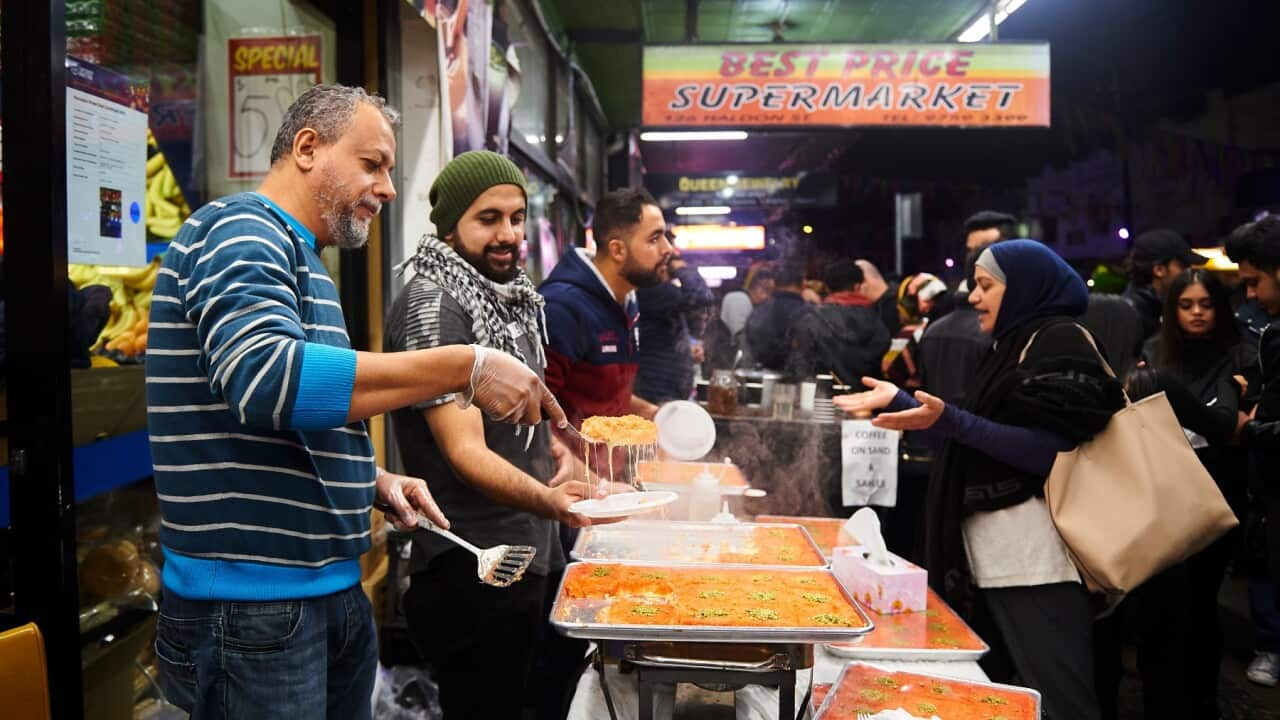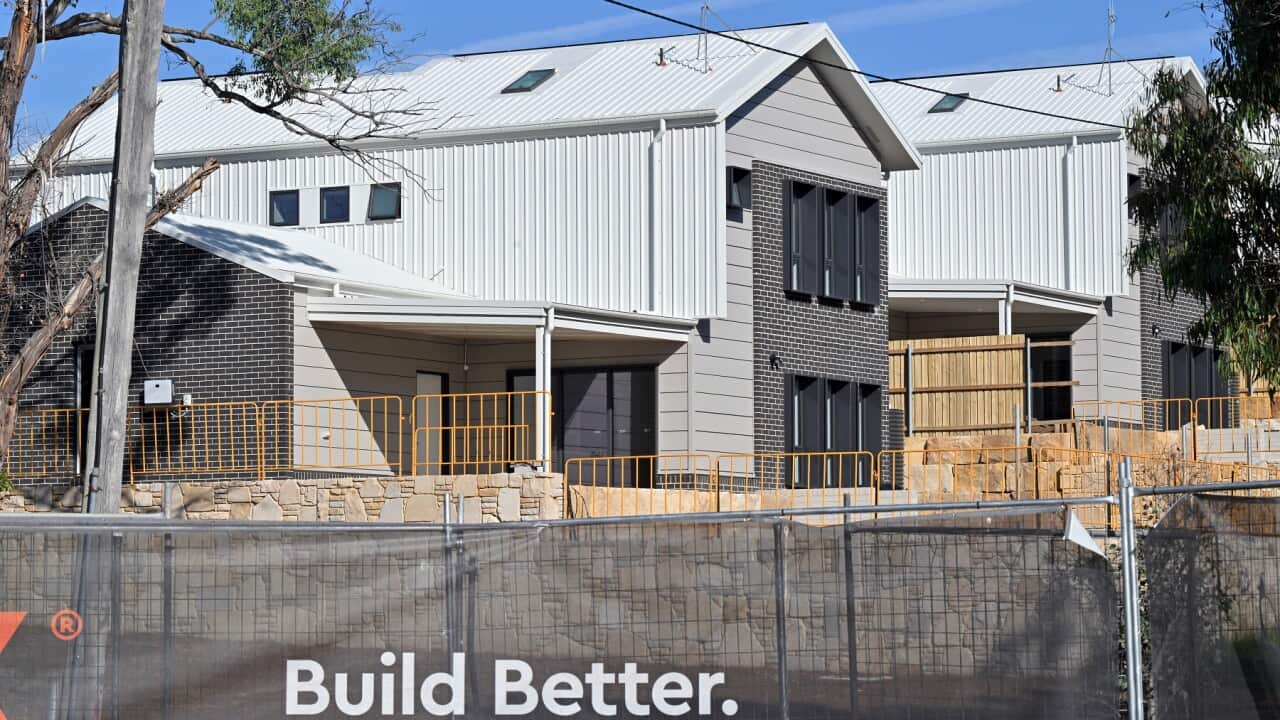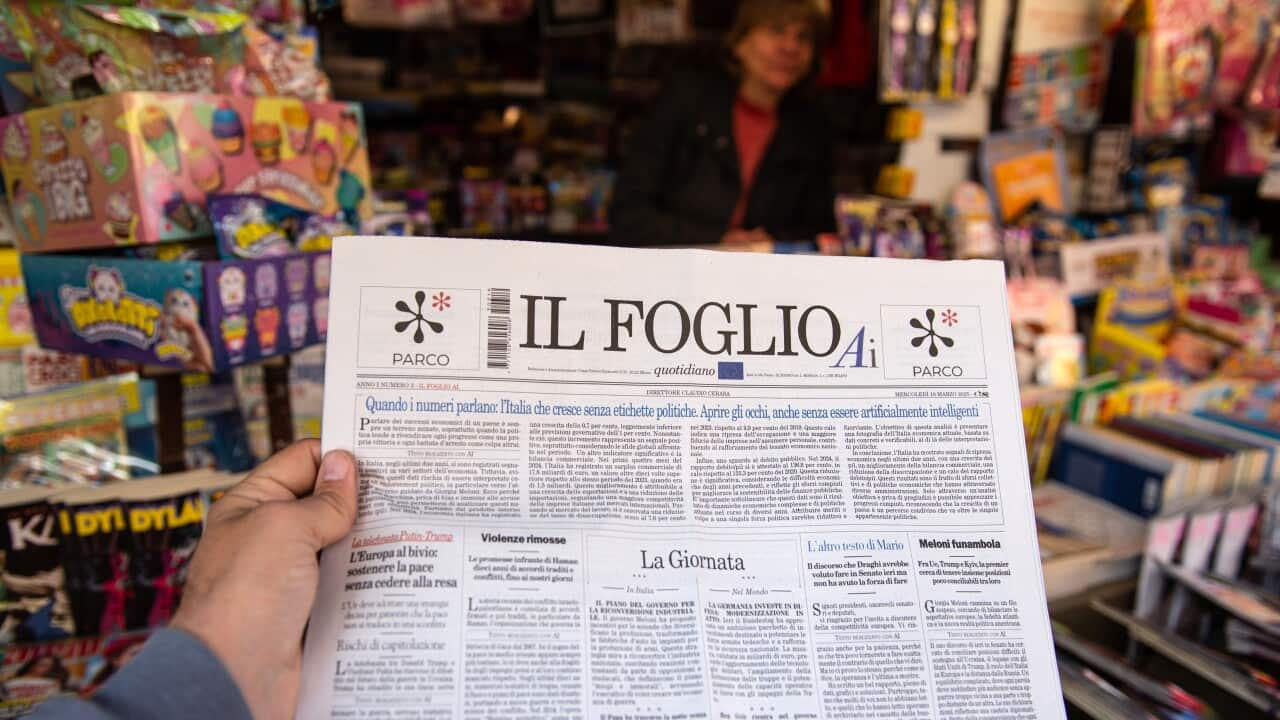English
It's the street synonymous with a feast.
For nearly 20 years, after sunset the main Lakemba strip has been a bustling hub during the Islamic holy month of Ramadan.
Now, it's transformed into one of the country's biggest annual multicultural food festivals, and loved by many local residents, including 50-year-old Shamim Shajal.
"We come almost every day in Ramadan, the whole Ramadan, we enjoy it."
Ramadan is the ninth month of the Islamic calendar, when worshippers abstain from food, drink and other activities from dawn until sunset.
For Muslims, it’s the most sacred time of the year; they are encouraged to let go of bad habits and increase prayer, introspection and charity.
Lakemba is home to more Muslims than any other suburb in the country, and has the largest mosque.
So it's become a natural meeting point for a late-night meal after a day of fasting and prayer during Ramadan.
From the markets' humble beginnings, starting as a single barbecue stand on the footpath, the event has evolved massively.
Sixty local businesses are setting up shop on the street and local council mayor Bilal El-Hayek says the markets are expected to contribute up to $50 million to the local economy.
"It's an absolute cracker of an event. There's no event in Australia that attracts more than 1.6 million people. That is more than the Easter Show."
But now, some Muslims feel what started as a spiritual safe space no longer represents what Ramadan is actually all about.
Imam Ibrahim Dadoun, from United Muslims of Australia, explains some of the community sentiment he has heard.
"It has become a lot more commercialised. The reality is Ramadan is not just about food, it's more about spirituality, it's about getting closer to God, getting closer to one another as Muslims in our community and also reaching out to the wider Australian community."
After hearing concerns, the Canterbury-Bankstown Council last October proposed a raft of changes.
That included scaling the markets back from 7 days to 4 days a week, and removing the word ‘Ramadan’ from the event branding.
What was once called 'Lakemba Ramadan Nights' was suggested to become just 'Lakemba Nights'.
But proposing to remove the Islamic reference was met with overwhelmingly negative feedback, including from some non-Muslim locals.
"I think that really secularises it a lot, and I think for the community who are deeply involved in their Muslim faith, I think it's a bit of a slap in the face."
A month later, the Council found a compromise, hoping to better reflect the diversity of community views.
It's now calling the event: 'Lakemba Nights during Ramadan', as mayor Bilal El-Hayek explains.
"Some people thought that this is not part of the religious element of the festival but the reality is there was a lot of people wanted Ramadan to stay in there so we've listened to the community. It was open, it was open on consultation."
The markets' ties to Ramadan are also seen by Imam Dadoun - and by some locals - as a soft opportunity to help combat rising Islamophobia.
"We understand that people love food and if it means that we need to get to the heart through the stomach, then so be it, welcome to Lakemba. Enjoy some food to eat, and let's have a conversation, you know, get to learn more about your Muslim neighbours, get to know more about Islam and what it means to be a Muslim and enjoy that company with one another as fellow Australians."
"A lot of people who are open-minded will come, meet other Muslims and just know that we're not bad people."
The markets will be open until the end of March.
Italian
È la strada sinonimo di festa.
Per quasi 20 anni, dopo il tramonto, la striscia principale di Lakemba è stata un centro animato durante il mese sacro islamico del Ramadan.
Ora si è trasformata in uno dei più grandi festival gastronomici multiculturali annuali del Paese, amato da molti residenti, tra cui il cinquantenne Shamim Shajal.
"We come almost every day in Ramadan, the whole Ramadan, we enjoy it."
Il Ramadan è il nono mese del calendario islamico, in cui i fedeli si astengono da cibo, bevande e altre attività dall'alba al tramonto.
Per i musulmani è il periodo più sacro dell'anno; sono incoraggiati ad abbandonare le cattive abitudini e ad aumentare la preghiera, l'introspezione e la carità.
Lakemba ospita più musulmani di qualsiasi altro sobborgo del Paese e ha la moschea più grande.
È quindi diventato un punto di incontro naturale per un pasto notturno dopo una giornata di digiuno e preghiera durante il Ramadan.
Dalle umili origini di questi mercati, che avevano un unico stand per il barbecue sul marciapiede, l'evento si è evoluto in modo massiccio.
Sessanta attività commerciali locali si sono insediate nella strada e il sindaco Bilal El-Hayek ha dichiarato che i mercati dovrebbero contribuire all'economia locale per 50 milioni di dollari.
"It's an absolute cracker of an event. There's no event in Australia that attracts more than 1.6 million people. That is more than the Easter Show."
Ma ora alcuni musulmani ritengono che quello che era nato come uno spazio spirituale sicuro non rappresenti più il vero significato del Ramadan.
L'imam Ibrahim Dadoun, di United Muslims of Australia, ha spiegato alcuni dei sentimenti della comunità che ha avvertito.
"It has become a lot more commercialised. The reality is Ramadan is not just about food, it's more about spirituality, it's about getting closer to God, getting closer to one another as Muslims in our community and also reaching out to the wider Australian community."
Dopo aver ascoltato le lamentele, lo scorso ottobre il Consiglio di Canterbury-Bankstown ha proposto una serie di modifiche.
Tra queste, la riduzione dei mercati da 7 giorni a 4 giorni alla settimana e la rimozione della parola “Ramadan” dal marchio dell'evento.
Si è proposto di chiamare quello che una volta era “Lakemba Ramadan Nights” con il nuovo nome di “Lakemba Nights”.
Ma la proposta di rimuovere il riferimento all'Islam è stata accolta da un'ampia maggioranza di commenti negativi, anche da parte di alcuni abitanti del luogo non musulmani.
"I think that really secularises it a lot, and I think for the community who are deeply involved in their Muslim faith, I think it's a bit of a slap in the face."
Un mese dopo, il Consiglio ha trovato un compromesso, sperando di riflettere meglio la diversità dei punti di vista della comunità.
Ora l'evento si chiama: 'Notti di Lakemba durante il Ramadan', come spiega il sindaco Bilal El-Hayek.
"Some people thought that this is not part of the religious element of the festival but the reality is there was a lot of people wanted Ramadan to stay in there so we've listened to the community. It was open, it was open on consultation."
Il legame dei mercati con il Ramadan è visto dall'Imam Dadoun - e da alcuni abitanti del luogo - anche come una “soft opportunity” per contribuire a combattere la crescente islamofobia.
"We understand that people love food and if it means that we need to get to the heart through the stomach, then so be it, welcome to Lakemba. Enjoy some food to eat, and let's have a conversation, you know, get to learn more about your Muslim neighbours, get to know more about Islam and what it means to be a Muslim and enjoy that company with one another as fellow Australians."
"A lot of people who are open-minded will come, meet other Muslims and just know that we're not bad people."
I mercati saranno aperti fino alla fine di marzo.











